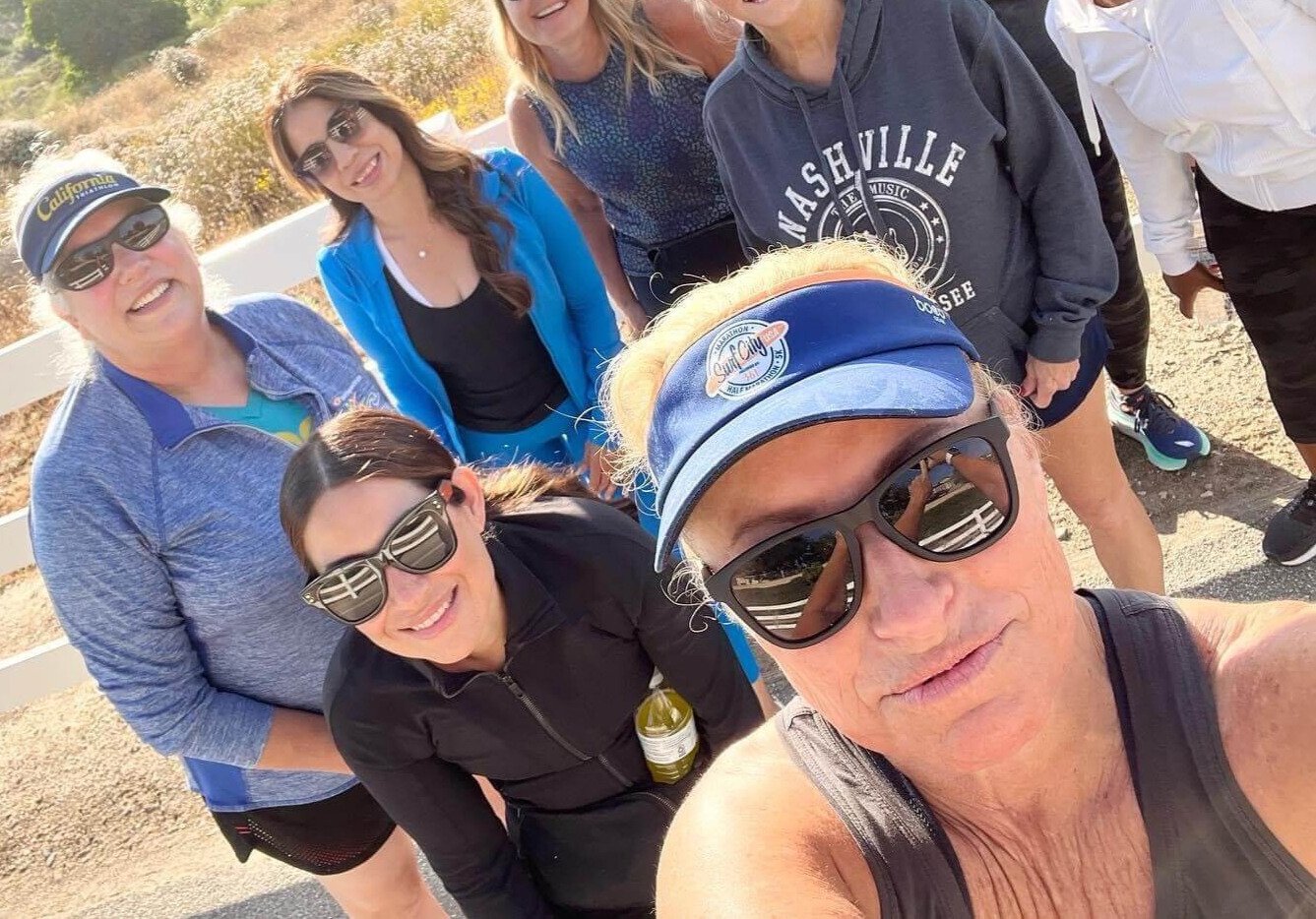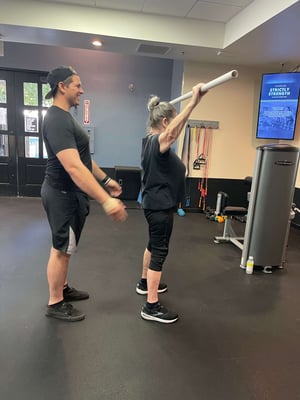How to care for your health as you enter perimenopause and menopause
July 24th, 2023 | 3 min. read
By Jen Azevedo

If you are like most women, you have entered your forties, and at some point, you notice a hot flash or two, your period showing up at random (and inopportune) times, and you feel a little more emotional than usual.
Most of us do not know much about perimenopause and menopause and come into this stage of life confused by the symptoms and ultimately unprepared for the changes in front of us.
What are you to do?
The Paseo Club is a social club in the Santa Clarita Valley. We offer fitness programs, nutritional counseling, and social events held throughout the month. We support members of all ages in achieving great health, no matter what stage of life they are in.
In this article, you will learn what perimenopause and menopause are, the symptoms of these conditions, and how best to care for yourself as you enter this time of transition.
What is menopause?
Menopause means the permanent “pause” or cessation of menstruation. This indicates the end of a woman's fertility and child-bearing phase. Menopause occurs after 12 months of no menstruation.
The World Health Organization estimates that by 2025, 1.1 billion women will be 50 years old or over, all of whom will (or soon will) be experiencing menopause.
What is perimenopause?
Perimenopause means "around menopause" and refers to the time when your body begins to make the natural transition to menopause.
The initial stages of perimenopause begin as the ovaries reduce their production of the hormones estrogen, progesterone, and testosterone. These are the hormones that allow a woman to become pregnant and menstruate.
Women start perimenopause at different ages. You may notice signs of perimenopause, such as menstrual irregularity, weight gain, and hot flashes some time in your 40s. But some women experience these changes as early as their mid-30s.
Perimenopause can last ten years.
What are the symptoms women experience in menopause and perimenopause?
When a woman is going through perimenopause and menopause, there are several physical and mental/emotional changes she may experience. Symptoms, and their severity, vary from woman to woman.
Physical changes
- Hot flashes
- Headaches
- Night sweats
- Urinary urgency
- Vaginal dryness
- Irregular periods
- Periods that are heavier or lighter than usual
- Trouble sleeping (mostly due to the hot flashes)
- Weight gain (typically five pounds magically appearing in your midsection)
Mental/emotional changes
- Mood swings
- Lack of sexual desire
- Brain fog and trouble concentrating
How to take care of your health during menopause and perimenopause
Although perimenopause and menopause are significant transitions in women’s lives, there are steps you can take to mitigate some of the symptoms and support your health as best as possible.
1. Eat well
A diet filled with fruits, vegetables, lean proteins, and healthy fats will give your body optimum nutrition. Increase your protein intake to help maintain muscle mass, balance your blood sugar levels, and feel full when you eat.
2. Limit alcohol
Unfortunately, that glass of wine (or two) in the evening to help you wind down may not be as helpful as you like. The Mayo Clinic discovered that alcohol can aggravate the symptoms of perimenopause and menopause. This is especially true for hot flashes, night sweats, and sleep disruption.
3. Limit caffeine too
Research shows, much like alcohol, caffeine increases vasomotor symptoms, aka hot flashes and night sweats. But caffeine is not without its advantages. A nice latte can boost mental clarity, memory, and mood. The moral of the story is to pay attention to how caffeine affects you and drink it in moderation.
4. Practice self-care
Self-care is the name of the game — for teens, parents, elders, and everyone in between. Women going through perimenopause and menopause are often juggling multiple tasks — kids, aging parents, home chores, relationships, and careers.
When you throw extensive body changes and mood swings into the mix — life can be stressful. Self-care is a necessary aspect of enjoying life.
 Acts of self-care can vary:
Acts of self-care can vary:
- Yoga
- Hot bath
- Exercise
- Massage
- Journaling
- Time with friends
- Time spent in nature
- Mindfulness or meditation
- A creative pursuit such as playing music or making art
5. Do weight-bearing activities
Strength training, hiking, and walking are great for people in all stages of life. Perimenopausal and menopausal women benefit from weight-bearing exercise because it minimizes the chance of developing osteoporosis, helps maintain a healthy weight, and increases levels of endorphins to elevate the mood.
Caring for yourself as you go through perimenopause and menopause
Women in their forties are often the “sandwich generation” raising kids while caring for aging parents. Throw in a full-time career and the responsibility of a home — it is a wonder how we even get up in the morning.
Unfortunately, this is also the time that our bodies begin to shift, bringing forth a host of new physical and emotional changes.
As you struggle to wear all of your different hats, this is the time to try to pause and take care of yourself. By taking good care of your body and practicing self-care, you can minimize the effects of perimenopause and menopause and feel better and more vibrant.
The Paseo Club offers over 60 fitness classes each week. There are also tennis and pickleball courts, a junior Olympic pool, a cafe, and an onsite spa. Members enjoy working out, eating, relaxing, and visiting with friends, family, and neighbors.
The Paseo Club offers several strength training classes to help you build muscle, lean down, and increase bone density.
- LIFT
- Pilates Mat
- Liquid Cardio
- TRX and Core
- Cardio Strength
- Strictly Strength
- TRX and Pilates
- Pilates Reformer
- Chisel Challenge
- Strength and Tone
- Weighted Bootcamp
- Paseo Tribe HIIT Core
- Core, Tone, and Strength
- Blood Flow Restriction Training
If you are not yet a member of the Paseo Club, then schedule a tour today. Check out our eight acres of facilities, and meet members and staff.
To learn more about health and wellness, read these three articles.
Jen Azevedo is a tennis professional, pickleball professional, personal trainer, group exercise instructor, and the general manager of the Paseo Club. She loves the community at the Paseo Club and that it is also a safe and fun place for her daughter. Jen’s favorite activities are joining her tribe for trail races or her partners for tennis matches. Occasionally Jen slows down to relax with a book — she reads over 100 a year!
Topics:


.jpeg?width=300&height=400&name=comp_IMG_4853%20(1).jpeg)
.jpg?width=300&height=400&name=compressed_IMG-0134%20(1).jpg)
.png?width=350&height=478&name=crop_comp_IMG-2697%20-%20Edited%20(2).png)
.png?width=400&height=394&name=crop_Compressed_IMG_9574%20-%20Edited%20(3).png)